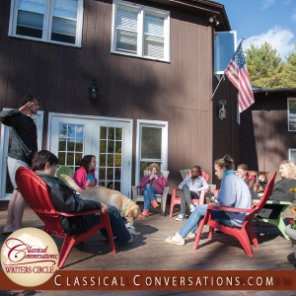“It is the glory of God to conceal a matter; to search out a matter is the glory of kings” (Proverbs 25:2 NIV).
Have you ever been spelunking?
When contemplating Socratic discussion, I like to think of it metaphorically as spelunking. Spelunking means cave exploring, and one who explores caves is a spelunker (and a person whose hobby is an exceptionally fun word to say). Now, if we were to merely hear an account of someone’s spelunking expedition, we might be fascinated and intrigued, but our second-hand knowledge would certainly be far removed from the hands-on experience of the spelunker. Even if the spelunker showed us some lovely photos, gave impassioned accounts of the adventure, and displayed artifacts for us to look at, the truth would remain. We have never gone below the surface to explore for ourselves. We remain spectators with a limited vantage point, not spelunkers.
Lecture can be this way. Although intriguing and inspiring information may be presented to us, it still is quite a passive experience. Engaging with abstract questions, however, tends to drive our thinking below the surface. Queries inspire us to put our helmet light on, propel down into a buried shaft, and explore more deeply a previously uncharted world of thought. We enter with hope and expectation that there will be hidden treasures to discover along the way, treasures that could not have been acquired unless we actually went spelunking for ourselves.
Questions tend to generate more questions. They keep the searchlight on. Doling out declarative answers tends to stop the seeking process. As we think through an idea or subject, we must be careful to explore interrogatively in order to propel the thought process forward. Since deep and critical thinking can only manifest through examination, it is essential to a classical education that students learn the art and form of inquiry. Challenge students have the benefit of partaking in this kind of inquiry weekly during their seminars, and as they become more proficient and comfortable with Socratic dialogue, they cultivate lifelong skills by actively seeking truth via this mode:
- They learn to ask questions of depth.
- They make connections between subjects.
- They learn to uncover the question hidden behind an answer.
- They become deep listeners.
- They love their neighbor by being respectful of others’ thoughts.
- They develop their sense of wonder, imagination, and conscience.
- They are humbled.
- They experience the strength of the collective mind.
- They live as part of the Body of Christ.
Socratic discussion, a truly collective experience, can only be achieved through participating in community. We can view this opportunity to act as iron sharpening iron as a gift we give to one another. As Colossians 2:2-3 says, “My goal is that they may be encouraged in heart and united in love, so that they may have the full riches of complete understanding, in order that they may know the mystery of God, namely, Christ, in whom are hidden all the treasures of wisdom and knowledge” (NIV). As we spelunk together and explore the hidden chambers of knowledge, we can help one another unearth the treasures of wisdom and understanding by exhorting and challenging ourselves and each other through the art of inquiry.




